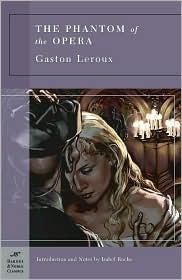The Phantom of the Opera
Den här boken är inte tillgänglig just nu
368 trycksidor
Intryck
- Theodore Maurice August "Vanderboom" Scarletdelade ett intrycki fjol👍Värt att läsa💧Tårdrypande
Citat
- Theodore Maurice August "Vanderboom" Scarlethar citeratför 2 år sedanDear Mr. Manager:
I am sorry to have to trouble you at a time when you must be so very busy, renewing important engagements, signing fresh ones and generally displaying your excellent taste. I know what you have done for Carlotta, Sorelli and little Jammes and for a few others whose admirable qualities of talent or genius you have suspected.
Of course, when I use these words, I do not mean to apply them to La Carlotta, who sings like a squirt and who ought never to have been allowed to leave the Ambassadeurs and the Café Jacquin; nor to La Sorelli, who owes her success mainly to the coach-builders; nor to little Jammes, who dances like a calf in a field. And I am not speaking of Christine Daaé either, though her genius is certain, whereas your jealousy prevents her from creating any important part. When all is said, you are free to conduct your little business as you think best, are you not?
All the same, I should like to take advantage of the fact that you have not turned Christine Daaé out of doors by hearing her this evening in the part of Siebel, as that of Margarita has been forbidden her since her triumph of the other evening; and I will ask you not to dispose of my box today nor on the following days, for I can not end this letter without telling you how disagreeably surprised I have been once or twice, to hear, on arriving at the Opera, that my box had been sold, at the box-office, by your orders.
I did not protest, first, because I dislike scandal, and, second, because I thought that your predecessors, MM. Debienne and Poligny, who were always charming to me, had neglected, before leaving, to mention my little fads to you. I have now received a reply from those gentlemen to my letter asking for an explanation, and this reply proves that you know all about my memorandum-book and, consequently, that you are treating me with outrageous contempt. If you wish to live in peace, you must not begin by taking away my private box.
Believe me to be, dear Mr. Manager, without prejudice to these little observations,
Your Most Humble and Obedient Servant,
Opera Ghost. - Theodore Maurice August "Vanderboom" Scarlethar citeratför 2 år sedan“And he stood up. Richard said: ‘But, after all, it seems to me that you were much too kind to the ghost. If I had such a troublesome ghost as that, I should not hesitate to have him arrested—’
“‘But how? Where?’ they cried, in chorus. ‘We have never seen him!’
“‘But, when he comes to his box?’
“‘ We have never seen him in his box.’
“‘Then sell it.’
“‘Sell the Opera ghost’s box! Well, gentlemen, try it.’
“There upon we all four left the office. Richard and I had ‘never laughed so much in our lives. - Theodore Maurice August "Vanderboom" Scarlethar citeratför 2 år sedan“‘But, after all, what does this ghost of yours want?’
“M. Poligny went to his desk and returned with a copy of the memorandum-book. The memorandum-book begins with the well-known words of saying that ‘the management of the Opera shall give to the performance of the National Academy of Music the splendour that becomes the first lyric stage in France’ and ends with Clause 98, which says that the privilege can be withdrawn if the manager infringes the conditions stipulated in the memorandum-book. This is followed by the conditions, which are four in number.
“The copy produced by M. Poligny was written in black ink and exactly similar to that in our possession, except that, at the end, it contained a paragraph in red ink and in a queer, laboured handwriting, as though it had been produced by dipping the heads of matches into the ink, the writing of a child that had never got beyond the downstrokes and has not learned to join its letters. This paragraph ran, word for word, as follows:
“‘5. Or if the manager, in any month, delays for more than a fortnight the payment of the allowance which he shall make to the Opera ghost, an allowance of twenty thousand francs a month, say two hundred and forty thousand francs a year.’
“M. Poligny pointed with a hesitating finger to this last clause, which we certainly did not expect.
“‘Is this all? Does he not want anything else?’ asked Richard, with the greatest coolness.
‘Yes, he does,’ replied Poligny.
“And he turned over the pages of the memorandum-book until he came to the clause specifying the days on which certain private boxes were to be reserved for the free use of the president of the republic, the ministers and so on. At the end of this clause, a line had been added, also in red ink:
“‘Box Five on the grand tier shall be placed at the disposal of the Opera ghost for every performance.’
fb2epub
Dra och släpp dina filer
(upp till fem åt gången)


